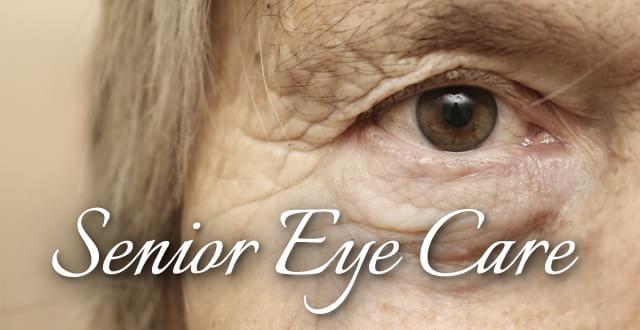As with most other organs, as we age, our eyes start to develop some problems. However, with proper care and treatment, most seniors can continue to have functional vision for many years. Some of the most common age related eye problems are cataracts, glaucoma, macular degeneration, and diabetic retinopathy.
The best and easiest way to identify these conditions is to schedule regular eye checkups as you become older. This will help the ophthalmologist spot vision problems when they are minor and help stop the damage or correct it before the issue increases in severity.
Cataracts
Cataracts are the most common cause of vision loss in older people. Normally, the lens that focuses light on the retina is clear. However, as we age it becomes cloudy and blurs our vision and makes it difficult for us to distinguish between colors. When the cataract begins to obscure our vision, the surgeon will remove the lens and replace it with an artificial one that is clear and will permit light to fall on the retina.
Glaucoma
An estimated three million Americans have glaucoma. However, only half of them are aware that they have this condition. Glaucoma is the buildup of pressure in the eye that can ultimately damage the optic nerve fibers. However, when detected early, it can be treated with eye drops or surgery to ensure that eye sight is not lost. While early diagnosis of glaucoma can help prevent blindness, it is a leading cause of blindness in those over 60. This makes it imperative that seniors undergo regular eye checks so that the ophthalmologist spots the problem at an early stage and stops the vision loss.
Macular Degeneration
The macula is a small part of the retina that helps us read fine print, threat a needle, and distinguish between colors. With age it can degenerate and lead to loss of fine vision, though peripheral vision will still be retained. Again, this is a condition that occurs gradually and usually begins with only one eye. When diagnosed early, it can be treated and central vision preserved.
Diabetic Retinopathy
More than a quarter of seniors over 65 years or more than 11 million seniors are suspected to be suffering from diabetes – both diagnosed and undiagnosed. This condition leads to many health problems including diabetic retinopathy. Diabetic retinopathy is a condition where the capillaries supplying blood to the retina are damaged because of high blood sugar levels. Over the years they capillaries can leak blood, fluids, and cholesterol. The condition can eventually lead to the retina being detached leading to a loss of eye sight.
Seniors must have themselves tested for blood sugar levels at regular intervals and work to control their sugar levels if needed. Uncontrolled blood sugar levels because you have not been diagnosed with diabetes can lead to other health complications including a loss of eyesight. Seniors should make it a point to exercise regularly, control their diet, and keep diabetes at bay if possible or under control.
Dry Eyes
Apart from the major eye problems that seniors might face, they are also more likely to suffer from dry eyes. This can lead to an itching or a burning sensation that is uncomfortable. Seniors suffering from dry eyes should consult an ophthalmologist who will likely prescribe eye drops to help them overcome this bothersome condition.
Seniors who want to continue to enjoy their favorite pursuits and lead an active life must care for their eye sight as well as their general health. Periodic visits to the ophthalmologist to ensure that the major eye problems are spotted at an early stage and treated are a salient way to ensure this.

